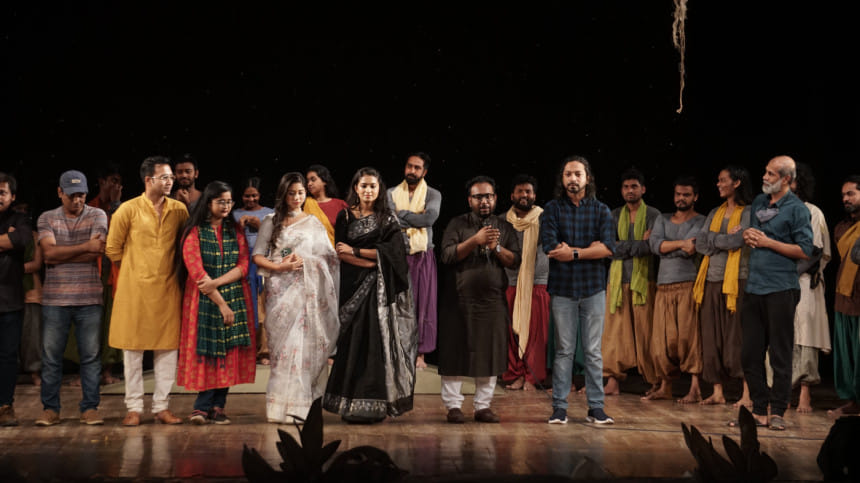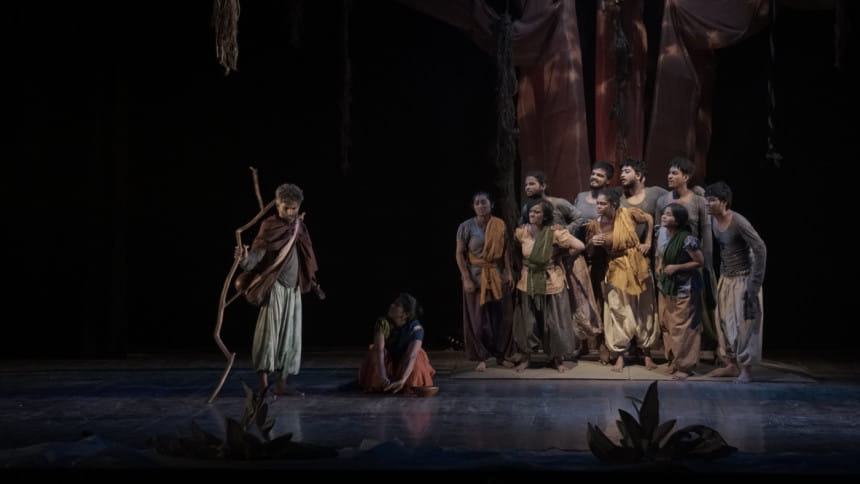Team Nishwas surprises Prachyanat at BSA

On the evening of September 15, Prachyanat—a prolific Bangladeshi theatre troupe—presented its 37th production of "Khowabnama" at the National Drama Theatre, Bangladesh Shilpakala Academy.
Adding to the momentous event, the programme was graced by the presence of the "Nishwas" team, including the director Raihan Rafi and the cast. Alongside them, on behalf of the Chorki team, were Tanzina Rahman Tasnim, Communication Officer; Mahmuda Sultana Rima, Operations Officer; Tahia Tunazzina, Junior Executive, Content Servicing, and Shaik Al Din Sadi, Junior Executive, Content Execution.
"Nishwas", the Raihan Rafi directorial web-film—which stars Tasnia Farin, Safa Kabir, Imtiaz Barshon and Syed Zaman Shaon—was released on September 15 and is currently streaming on Chorki.

The play is based Akhtaruzzaman Elias's book of the same name. "Khowabnama" is the ultimate Bangladeshi epic, epitomising the customs of Bengali rural life from time immemorial. The plot is set in the 1940's, in the undivided Bengal following the 1943 famine.
The story culminates in the Tebhaga Peasant Movement and the Partition of 1947. "Khowabnama" follows the pastoral lives of boatmen, fishermen, farmers, oilmen, zamindars, jotedars, sharecroppers, and neo-bourgeoisie of Northern Bengal during that era of the socio-political upheaval.
"Khowabnama" is often enigmatic to its readers due to its polysemic and synesthetic elements, dialogues in colloquial language, customs and superstitions of Bengali villagers before the emergence of the British Empire.
However, the musical quality of this Bengali epic and magical possibilities of mundane rural life are highlights of its storytelling. Prachyanat has done an excellent job of adapting the magic from the pages of Akhtaruzzaman Elias's magnum opus to the theatre stage.

The central characters of the play are: Tamiz, a fisherman's son; Tamiz's father, grandson of a renowned fisherman—who can interpret people's dreams—and the grandson-in-law of Cherag Ali Fakir.
Fakir was a gifted mystic who skilfully interpreted people's dreams by using his manual of dreams or Khowabnama as he liked to call it.
As per the folklore and the dreams of Tamiz's father, Munshi's ghost resides in the pakur tree. Interestingly enough, Munshi was a fakir, who died fighting against the British in the 1760's Fakir-Sannyasi Resistance. Every night Tamiz's father sleepwalks to Katlahar and sees Munshi sitting on the top branch of the pakur tree, controlling all the events of the Girirdanga and Nijgirirdanga village.
Eventually, extinction of the tree brings about a series of mishaps in their village. In this manner, "Khowabnama" strives to depict how people's symbolic dreams merged with the horrific realities of 1947 partition.
The play has been written by Md Shaokat Hossain Shajib and directed by Kazi Toufikul Islam Emon. Rahul Ananda composed the music, while Snata Shahrin was behind the choreography.
"Khowabnama" creates a surreal ambience—transporting the audience to the tumultuous pastoral life of 1940's Bengal. It stands as a proud reminder of our age-old Bengali heritage, mythology, and traditions.

 For all latest news, follow The Daily Star's Google News channel.
For all latest news, follow The Daily Star's Google News channel. 




Comments